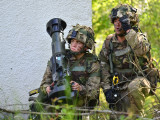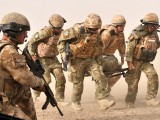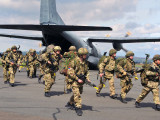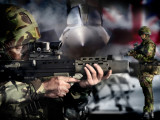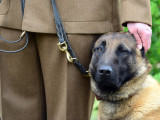
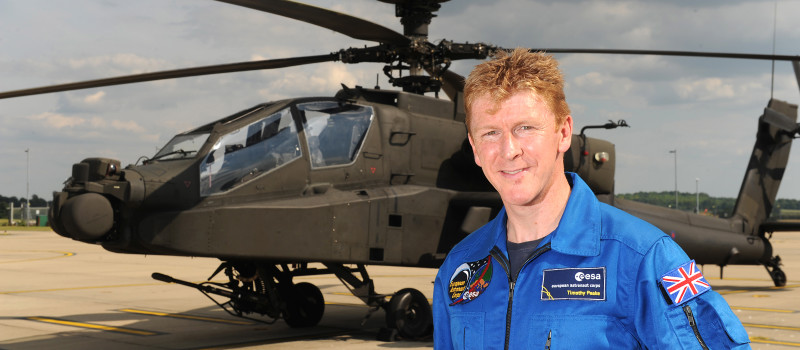
Major Tim to Ground Control
Major Tim Peake, a former Apache pilot with the Army Air Corps, is the first Briton to be appointed by the European Space Agency (ESA) Astronaut Corps and begins his mission on the International Space Station (ISS) in November.
Tim, aged 42, who maintains his flying in the Army Reserve, will be conducting a range of scientific experiments and maintenance work, including using the robotic arm and spacewalking, if the opportunity arises.
Married father-of-two Tim, who joined the European Space Agency (ESA) in 2009, took time out of his busy schedule to answer our questions. From flying Apaches to life in space, and from spaceman food to orbital soundtracks: find out what he had to say:
Why did you decide that you wanted to become an astronaut?
I’d been working as a military test pilot in the five years before I applied to ESA, so I had already had an interest in the space sector – aviation and space are linked and share many similar technologies. When the European Space Agency announced they were selecting new astronauts in 2009, I was ideally placed to apply and thought it too good an opportunity to miss. For me, being an astronaut combines all the elements that I found rewarding about a test pilot career with the incredibly exciting prospect of being part of an international effort to advance our knowledge of science and human space exploration.
How difficult was it to get onto the ESA’s training programme?
ESA was looking for people who were qualified in science or engineering, with demonstrated outstanding abilities in these fields, preferably including operational skills. First we filled in online questionnaires, but after that the selection rounds got tougher each time. These rounds of computer-based tests, psychological assessments and personal skills eventually reduced the 8000 applicants to around 20 or so. Around 50 per cent of the candidates failed the stringent medical requirements. The remaining candidates went through formal interviews, with the final 10 being invited to meet ESA’s Director General, Jean-Jacques Dordain.

What qualifications did you need?
Candidates had to have a university degree or equivalent at Masters or Doctorate level in natural sciences, medicine, engineering, IT or mathematics. If we applied as pilots, we had to have a minimum of 1000 hours on various high-performance aircraft, preferably as test pilots, as well as a degree. I trained as a helicopter pilot, flight instructor and test pilot, and I have a BSc in flight dynamics and evaluation from the University of Portsmouth.
How has your Army training helped when you have been training with ESA?
I think my Army training has helped enormously in preparing me for being an astronaut. The Army provides an opportunity to develop personal skills that are extremely useful in many walks of life. Some of the skills that you learn along the way as a test pilot or pilot in general are fundamental to the astronaut role. Not just in terms of getting on as a crew, but also in terms of accurate and timely analysis of problems and stability in emergency situations. In addition to these characteristics, astronauts must have good interpersonal and communication skills in order to operate effectively in a multi-cultural environment.
Has being an Apache pilot helped in any way?
Yes, I’m sure it has! The tandem seat arrangement of the Apache demands clear, concise verbal crew communication. Furthermore, the skills developed for target tracking have proved extremely useful when manipulating the Space Station’s robotic arm. And, of course there’s the ability to look at different things with each eye…
 What skills have you carried over into your astronaut training?
What skills have you carried over into your astronaut training?
There have been a couple of hair-raising moments in my career and I think you would be hard pushed to speak to a helicopter pilot with 3000 hours who hasn’t had one or two emergencies. It’s the nature of the job really. You explore the limits of aircraft performance, but before each flight, you spend a lot of time analysing the risks and making sure everything is safe. On the other hand, you have to accept some risk in order to progress. This is very similar to spaceflight. I’ve found that in emergency situations the training really does take over, which is a bit of a cliché, but simply it means that you stay calm, analyse the problem and find a solution as quickly as possible.
Did you always dream of being an astronaut?
No, not really. I hadn’t seriously thought about becoming an astronaut before the ESA selection in 2008. Before then I had just assumed that there was no easy path for a British citizen to become an astronaut.
What will you be doing in space? What will your role be?
I’ll be conducting scientific experiments and doing maintenance work on the ISS. The ISS actually comprises a number of laboratories all bolted together and scientific research is the main focus of the mission. Much of the maintenance work involves checks, routine replacements and repairs. In addition, several of the visiting resupply vehicles require capturing using the space station’s robotic arm. There are also scheduled spacewalks, in order to repair or replace parts on the outside of the space station. There’s no guarantee, but maybe I’ll get a chance to do that.
Are you nervous or excited about going into space in a rocket?
I think as anyone you have to be aware of the risks of sitting on top of a huge rocket, but no, I’m definitely not nervous. Once in space, it’s not an unfamiliar environment to be working in, so I’m not overly apprehensive. This is what all those years flying aircraft have been leading to. I’ve carried out some fairly high-risk flight tests, so my future career is probably far safer than my past career. I am actually very excited to be going up. I’m looking forward to it. Using the robotic arm, for example, or a spacewalk if the opportunity arises – that would be the icing on the cake. Then there’s simply living and working in space for six months. Looking down on planet Earth will be an incredible sight.
How have you found the weightlessness training?
I’ve done some zero-g training in an aircraft, which was fun, but I think you mean practicing for spacewalks. We do that underwater in a neutral buoyancy laboratory (a huge swimming pool!) in Houston, and we repeat these sessions until they become second nature. It is certainly very physically and mentally demanding; wearing a pressurized space suit for 6 hours is extremely tiring. We train quite often – right up until launch. I absolutely love it, but it’s by far the most challenging training so far – apart from Russian language class, that is!
Is there a favourite food you are allowed to take or will miss because you can’t take it?
Space food hasn’t always had a good reputation, but it has come a long way since the early days of spaceflight. I love a good Sunday roast with Yorkshire pudding, beef stew and, of course, curry. And I like desserts too, such as apple pie with ice cream or rhubarb and custard. Surprisingly, many of these foods can be adapted for spaceflight. In fact, there was a competition for kids to develop British-inspired space food, designed with some of these tastes in mind especially for my mission, with chef Heston Blumenthal. Probably the most unwelcome foods in space are things like crisps (with crumbs that would go everywhere) or anything with liquid that could not be contained.

What does your family think about you becoming an astronaut?
I am extremely fortunate as my family and friends are extremely supportive. Rebecca takes everything in her stride. We’ve been married for nearly 15 years now and she was in the Army herself so she knows the pressures that we will have to face. Of course I will miss her and my boys terribly, but we will still be able to communicate when I am away via email and by phone. In fact, communicating with family from space is probably easier than it is for many military personnel deployed on operations! And of course, my kids will be able to say that their dad really is an astronaut.
How easy do you think it will become for others to follow in your footsteps?
For other Europeans to go into space? When the next astronaut selection comes along, I’m sure many more will get the chance. As long as you bear in mind that there really is no single route to becoming an astronaut. The best chances of success are to have a solid foundation in the core sciences or experience as a pilot, but it has more to do with being passionate about what you do and being as good as you can be. Keep working at it.
In a ‘Desert Island Discs’ moment, what music will you be listening to?
I like a wide range of music, for different moods, from rock to classical. I like U2, Coldplay, Matchbox 20, Snow Patrol and Madness for example, but there are also some great film soundtracks that I know will sound just fantastic when I’m looking at Earth from the Cupola – Layer Cake is one of my favourites.

